Is Ghost Protein Healthy (From a Nutritionist)?
In this blog post, I’ll review whether Ghost Protein is healthy or not? Find out what this product’s nutrition pros and cons are, plus some better options to consider. In general, Ghost Whey Protein is not considered a good for you.
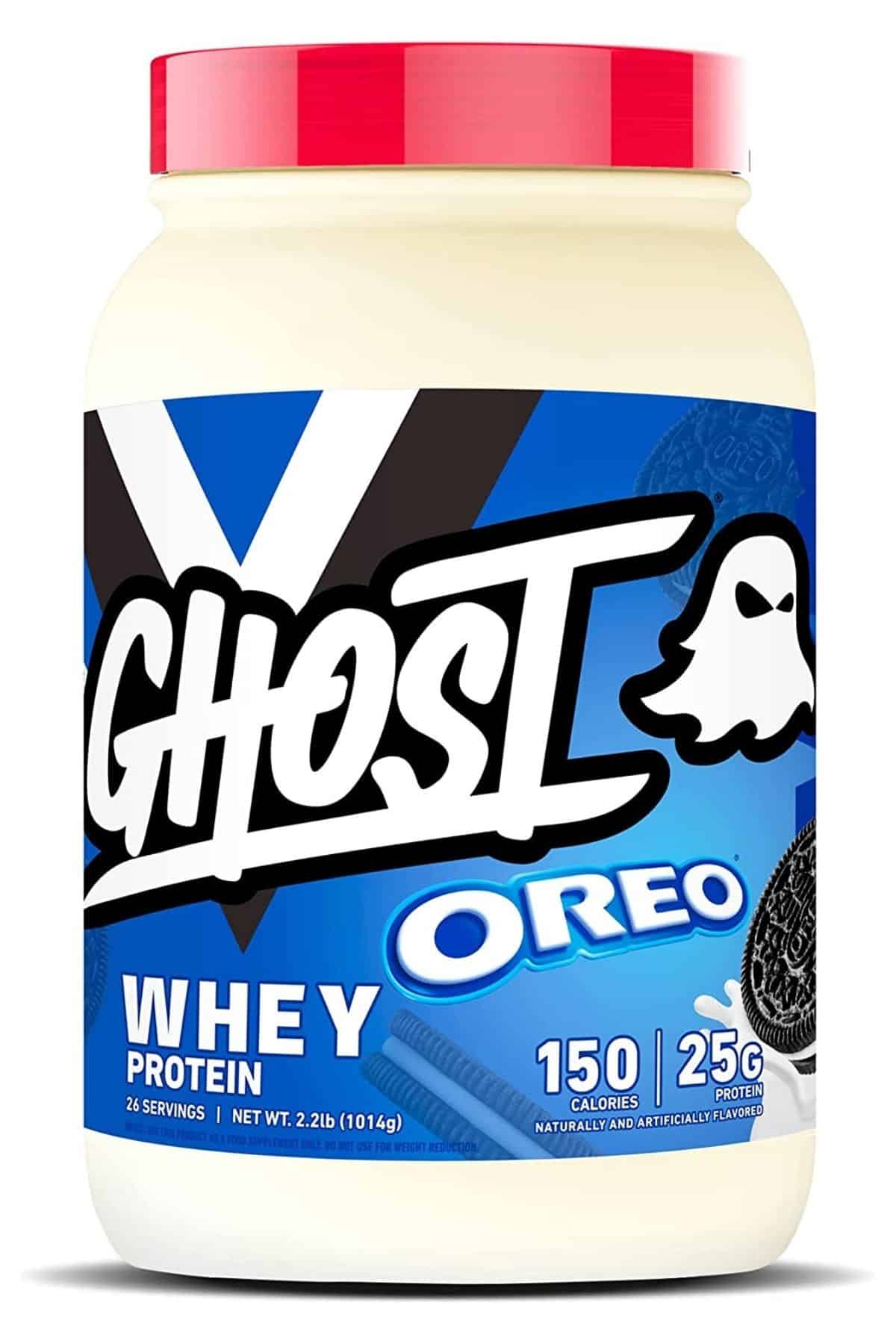
Ghost Protein Facts
Ghost is a lifestyle sports nutrition brand that also makes apparel and merchandise like shakers, glow sticks, and beach towels part of the “ghost lifestyle.”
Ghost makes whey and pea protein powders for athletes and active people who can benefit from additional calories or want to build size and muscle mass as part of their weight loss or fitness goals.
It also has a line of energy drinks and hydration drinks (read my related article on “Why Ghost Energy Drinks Are Bad For You.”)
Ghost protein powder is available in a variety of flavors.
The company claims that Ghost protein powder is gluten-free, soy-free, and free from added sugars, but this only applies to some flavors.
Additionally, there is a Ghost line of vegan protein powders as well.
Ghost Protein Ingredients
The protein content of Ghost products comes primarily from whey powder (except for the plant-based protein powder).
As an example, here is the ingredient list for the Ghost Whey Protein Powder in the Oreo flavor:
- Whey Protein Blend (Whey Protein Isolate, Whey Protein Concentrate, Hydrolyzed Whey Protein Isolate)
- Oreo Cookie Pieces (Unbleached Enriched Flour, Sugar, Palm and/or Canola Oil, Cocoa (processed with alkali), Invert Sugar, Leavening (baking soda and/or calcium phosphate), Soy Lecithin, Salt, Chocolate, Artificial Flavor)
- Natural and Artificial Flavors
- Cellulose Gum
- Xanthan Gum
- Sucralose
- Sunflower Lecithin
- Enzyme Blend (Protease, Bromelain, Amylase, Lactase, Lipase)
- Salt
Here is some more information on the main ingredients and what they can potentially mean for your health.
Whey Protein
Ghost whey protein powder contains a blend of whey protein isolate and whey concentrate, a highly processed protein source that comes from dairy.
Manufacturers make whey protein by removing non-protein components from milk to create a high-protein product. Whey protein isolate contains more protein and fewer carbohydrates and fat than whey protein concentrate.
Part of the whey protein in this product is hydrolyzed, which means it’s processed to make it easier to digest. It also contains less lactose, which may make it less likely to cause digestive problems. Despite this, some people experience digestive issues when they use whey protein, especially those sensitive to dairy.
Besides the potential for side effects, it’s important to note that studies linked whey to adverse effects on liver and kidney function.
As a holistic nutritionist, I would prefer if people consumed protein from real food sources. Try recipes like my Costco Chicken Salad Recipe, Slow Cooker Tri Tip Roast with Vegetables, or other foods on an Ancestral Diet.
Sunflower Lecithin
Sunflower lecithin is an additive derived from sunflower seeds. In protein powders, this additive creates a smooth, creamy texture, helps prevent separation, and helps powder dissolve more easily.
Some health experts argue that sunflower lecithin can cause digestive problems, and research suggests it may negatively affect the gut microbiome.
Artificial and Natural Flavors and Colors
Most synthetic additives adversely affect health; the same goes for artificial flavors and colors. Studies have demonstrated links between artificial food colors and cancer and between artificial food colors and autism.
According to research, artificial flavors and colors may be toxic, and you should limit your consumption.
The risks are clear, but flavor manufacturers have no regulatory body. While food manufacturers must disclose ingredients, flavor manufacturers can add preservatives, emulsifiers, carriers, and even solvents to their products without disclosing this information.
Since this applies to natural and synthetic flavors, there is no way to tell if the flavors in Ghost protein are safe for consumption.
Artificial Sweeteners
All Ghost protein flavors contain sucralose, and some contain acesulfame potassium – both artificial sweeteners.
Sucralose is a highly processed and chlorinated non-nutritive sweetener humans can’t metabolize.
According to at least one study, long-term consumption of sweeteners like sucralose can cause inflammation, which has profound health implications, including heart disease, obesity, and diabetes.
Acesulfame potassium is yet another non-nutritive sweetener with a controversial reputation. According to the FDA, this additive is safe, but strict rules exist around how much is safe to consume.
Research suggests that this additive may harm women with certain medical conditions. Another study on mice linked acesulfame potassium consumption with weight gain and changes in the gut microbiome.
Digestive Enzymes
One thing differentiating Ghost protein from other protein powders is that it contains the digestive enzymes proteases, bromelain, and lactase. These enzymes help promote digestive health.
Proteases are responsible for breaking down protein molecules into amino acids, aiding in their absorption and utilization by the body.
Bromelain has anti-inflammatory properties and helps proteins to digest. It can help reduce bloating and discomfort.
Lactase breaks down lactose in dairy products, making it easier to digest. Adding digestive enzymes to your diet can enhance nutrient absorption, reduce digestive issues, and boost digestive health.
It’s important to note that although digestive enzymes are generally considered healthy, they can cause side effects in some people, including digestive problems, and they can interact with some medications, for example blood thinners, diabetes medications, and antacids.
Nutrition Pros
Ghost protein products can be a convenient way to increase your protein intake, and it includes digestive enzymes, which can be a healthy addition to your diet.
Less processed versions of whey protein powder could be useful for fitness enthusiasts who do regular strength training and want to gain mass and build muscle.
The increase in protein could help athletes to enhance their performance, and it may reduce muscle recovery time. Some of the Ghost protein flavors are soy-free and gluten-free.
Nutrition Cons
Ghost protein is a highly processed product sold in plastic containers that are not good for the environment. It contains several potentially unhealthy ingredients like artificial sweeteners, seed oils, colors, and flavors.
Ghost protein is made of whey, a milk product, so it is unsuitable for vegans or dairy-free people. Some flavors contain wheat flour, making it unsuitable for people with a wheat or gluten allergy or intolerance.
See my related review, “Is Orgain Protein Powder Healthy?“
Lastly, there may be warning labels on some versions of Ghost protein products about potential exposure to heavy metals.
Ghost Protein Nutrition FAQs
Yes, Ghost protein is a highly processed product with ingredients that can cause digestive issues like gas, cramps, bloating, diarrhea, and constipation.
No, it is not. It is made of whey, so it is a dairy product and, therefore, not suitable for anyone with a plant-based diet or people who are allergic or intolerant to lactose or dairy.
Although there is one flavor that is soy-free and gluten-free, most Ghost protein powder flavors contain at least one serious allergen. The high fructose corn syrup in some flavors can cause insulin spikes, which cause severe health problems for people with diabetes.
According to the company, it tastes better than other protein powders. It comes in a range of flavors that other brands don’t have. Nutritionally, this protein powder brand differs from other protein supplements because it contains digestive enzymes, not a common ingredient in other brands.
Maybe, as it can help you to build muscle because that is what protein does. It also contains digestive enzymes that help break the protein into smaller amino acids, aiding in the digestibility and absorption of the protein.
Don’t Miss These Product Reviews!
Ghost Protein Nutrition Conclusions
Ghost protein powder is a highly processed product with many potentially unhealthy ingredients that can cause side effects. The healthiest way to include more protein in your diet is to eat more high-quality, natural foods like lean, organic meat and fish, bone broth, or make a real food protein smoothie at home like my Flat Belly Smoothie.
Don’t forget to join my newsletter list to get exclusive clean eating recipes and tips. The newsletter is 100% free with no spam; unsubscribe anytime.
About the Author: Carrie Forrest has a master’s degree in public health with a specialty in nutrition and is a certified holistic nutritionist. She is a top wellness and food blogger with over 5 million annual visitors to her site. Carrie has an incredible story of recovery from chronic illness and is passionate about helping other women transform their health. Send her a message through her contact form.
Note: this post is for informational purposes only and is not intended as medical advice. Please consult your healthcare provider for recommendations related to your individual situation.


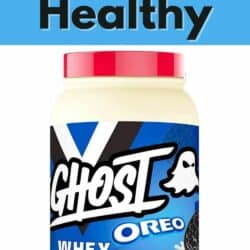
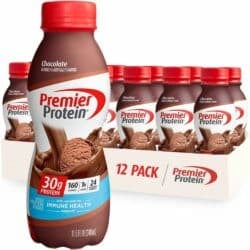
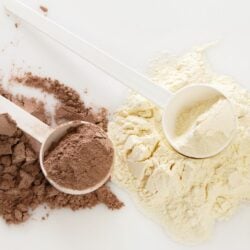
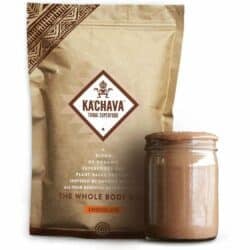
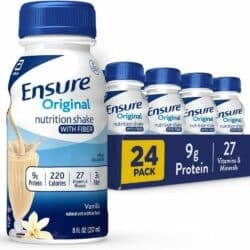














Can you cite any specific ingredients or this just a general criticism? This protein is currently the only way I can get enough calories and protein in my diet – cooking and eating “whole foods” is not an option.
I did cite specific ingredients and the potential health issues. There are much better protein powder options in my personal opinion.